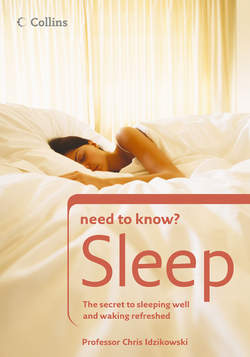Читать книгу Sleep: The secret to sleeping well and waking refreshed - Prof. Idzikowski Chris - Страница 11
must know
ОглавлениеSleep deprivation
• 20-25 hours of sleep deprivation reduces mental performance to the same level as someone with a blood/alcohol concentration of 0.1 per cent, which is greater than the current maximum for legal driving in the UK – 0.08 per cent.
• The US Department of Transportation estimates that 100,000 accidents every year are caused by people feeling fatigued and/or drowsy, and that it leads to 4 per cent of all traffic-related deaths.
• Mood. Lack of sleep can lead to irritability and over-anxiety, which can have damaging effects on your social life, family and other relationships.
• Immunity. Evidence suggests that lack of sleep may affect the immune system. After vaccination, subjects who may have been sleep-deprived have 50 per cent fewer antibodies than those who have slept adequately. Sleep and the immune system are strongly linked; bacterial cell walls can stimulate the sleep centres directly.
• Rational decision-making. Studies show that sleep deprivation can affect general judgement and decision-making abilities, and that people who are sleep-deprived have difficulty in responding to rapidly changing situations. The real-life consequences can be grave. Fatigue is now known to have been a contributory factor in many international disasters such as the nuclear explosion at Chernobyl, the Exxon Valdez oil spill and the Challenger shuttle explosion.
Apart from these common short-term effects of sleep deprivation, there are also long-term consequences. American research suggests that long-term sleep deprivation (defined as interrupted sleep over a period of about a year) may be linked with obesity. Studies carried out at Colombia University have shown that 73 per cent of people who sleep only 2-4 hours a night are more likely to be obese than those who sleep for seven hours. The reason is unclear but it may be because chemicals that play a key role in appetite and weight gain are released during sleep. Other long-term consequences include extreme anxiety, depression, specific sleep-related disorders and even psychosis.
